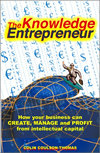 |
 |
|
 |
Corporate Communications in Crisis
By Professor Colin Coulson-Thomas
Modern corporations are essentially networks of relationships based
upon trust. When a reputation for fair dealing and accurate reporting
is compromised the consequences can be dramatic. Worldcom imploded.
Executives at Enron went to great lengths to conceal the true state of
their companies’ affairs. As a consequence, customers have lost
a supplier and suppliers a customer. Employees have forfeited their jobs
and investors their savings. Association with misrepresentation sealed
the fate of Arthur Andersen.
Are recent high profile scandals isolated instances of deception? Or is
there a wider crisis in corporate communications? Looking ahead what should
we look out for to predict or prevent future meltdowns?
Corporate value statements advocate openness. Professional codes of practice
champion integrity. Managers are expected to have ‘communication
skills’. Substantial investments have been made in communications
technologies. A distinctive vision, stretching goals and clear objectives
can inspire, excite and energise people. However, many companies fall
short of these ideals.
Looking at what communicators actually do rather than what they say reveals
a wide gulf between corporate rhetoric and commercial reality. People
are drowning in irrelevant information. They are overloaded, overworked
and insecure. With little time to think many do not see the wood for the
trees. Some suspect that corporate communications are all smoke and mirrors.
The Centre for Competitiveness has examined the communications practices
of a wide range of companies in key areas such as winning business, building
relationships and managing change. Research teams compare the approaches
of ‘winners’, companies that cope with changing circumstances,
with ‘losers’, businesses that struggle or fail. Fundamental
differences of attitudes and behaviour emerge.
Lets start with vulnerable companies and practices that should trigger
alarm bells. Communications are largely top down and one-way. Communicators
simply pass on whatever messages their bosses wish to communicate. They
don’t question a brief or ask whether information they are handed
is accurate or fair.
Losers only communicate when they feel they need to. They become preoccupied
with messages they would like to put across. Recipients are just targets.
Smart communicators in floundering companies pride themselves on their
ability to distract, exaggerate or keep a situation under wraps. They
avoid speaking to people directly and hide behind technology. Sanitised
summaries are posted on corporate Intranets.
The communications of struggling companies are often bland and non-committal.
They give little away. Bad news is hidden under the carpet. Slick packaging
encourages passive acceptance. Communicators mouth generalisations and
repeat slogans. Their work is often of a high technical standard. But
the focus is upon form and style rather than relevance and impact.
Communicators in stagnant and dying companies are emotionally detached.
They display little personal commitment to corporate messages. Their communications
are cold, clinical and bland. Many are sophists and cynics. Communications
is a game to be played. Scoring points is more important than helping
others to understand.
In ailing companies corporate communications is a distinct activity undertaken
by dedicated specialists. They do the CEO’s bidding, work mechanically
and struggle to highlight what is different, special or unique about their
employer. Not surprisingly they fail to connect with key stakeholder groups
and spend much of their time rationalising failure. When they stumble
few help. People who have been tricked or feel duped look the other way.
Communicators in successful businesses are more confident and have less
to hide. They behave very differently. They share information, knowledge
and understanding with people whose cooperation is needed to achieve corporate
aspirations. They engage in two-way communication. They encourage, welcome
and react to feedback.
Good communicators are not pre-occupied with themselves. They focus on
the people they would like to establish, build and sustain relationships
with. They try to understand, empathise with and reflect their aspirations,
hopes and fears. They make direct and personal contact. They feel. They
may stumble over the words, but they demonstrate they care.
Communicators in winning companies consciously build mutually beneficial
relationships. They forge longer-term partnerships. They are both sensitive
and flexible. They listen. They monitor reactions and are alert to changing
requirements. Communications activities evolve, as changes are made to
ensure greater relevance.
Effective communicators identify unmet needs, analyse communications barriers
and address problems. They recognise the importance of symbols and are
visibly committed. They understand they and their colleagues will be judged
by what their actions and conduct. They endeavour to match words with
deeds.
In companies with prospects communication is an integral element of management.
It is built into work processes and the roles of managers. Communicators
think for themselves. They question motivations, probe sources and assess
likely implications. They take steps to ensure the veracity of corporate
messages. They assume responsibility for what they communicate.
Winners explain with conviction the essence of what they are about. Their
communications celebrate and sustain success. They engender allegiance
and foster relationships that withstand market shocks and survive the
traumas of economic downturn. People trust them and will put themselves
out for them.
Investors, employees, customers, suppliers and independent directors should
never take corporate communications for granted. The intelligence, standing
and bravado of corporate leaders and their professional advisers are no
guarantee the full story is being told. Be alert to tell tale signs of
whether communication approaches and practices indicate likely failure
or herald future success.

Professor Colin Coulson-Thomas |
About the Author:
Professor Colin Coulson-Thomas is an experienced chairman of award
winning companies and consultant. He has advised over 80 boards
on how to improve board and corporate performance, leads the world's
largest winning business research and best practice programme, and
has reviewed the processes and practices for winning business of
over 50 companies.
Following marketing and general management roles Colin became the
world's first Professor of Corporate Transformation and more recently
Process Vision Holder of major transformation projects. He is the
author of over 30 books and reports, including ‘Individuals
and Enterprise’ (Blackhall Publishing, 1999), 'Shaping Things
to Come' (Blackhall Publishing, 2001), 'Transforming the Company,
Manage Change, Compete and Win' (Kogan Page, 2002 and 2004)
and ‘The Knowledge Entrepreneur’(Kogan Page,
2003). Colin has spoken at over 200 national and international conferences
and corporate events in over 20 countries. He can be contacted:
Tel: 01733 361 149
Fax: 01733 361 459
Email: colinct@tiscali.co.uk
Web: www.ntwkfirm.com/colin.coulson-thomas
|
|
Transforming the Company: Manage Change, Compete & Win
Colin Coulson-Thomas shows that to bridge the gap between rhetoric
and reality, business people must make far-reaching decisions about
the value to them and their companies of particular theories, past
assumptions and traditional approaches. Based on original research,
the first edition of this was ahead of its time and predicted many
of the current management trends. The author now brings the text bang
up-to-date for the 21st century. This second edition of Transforming
The Company shows how to turn theory into practice by highlighting
the obstacles and barriers that confront companies when trying to
bring about change. For management at all levels faced with this task,
this thought-provoking book will inspire and enlighten. |
| 
Buy
UK Buy
US
|
The Knowledge Entrepreneur: How Your Business Can Create,
Manage and Profit from Intellectual Capital
In many companies knowledge management has focused almost exclusively
upon the packaging of existing knowledge. This book is designed
to help readers boost revenues and profit by significantly improving
the performance of existing activities and also creating new offerings
that generate additional income. It shows how practical knowledge-based
job-support tools can transform work group productivity, and reveals
the enormous scope for addressing contemporary problems such as
"information overload" with imaginative responses. Additional
information includes: a list of possible commercial ventures; detailed
checklists that can be used for identifying and analysing opportunities
for knowledge entrepreneurship; and exercises for assessing entrepreneurial
potential and "scoping" possible products and services.
The free CD-ROM packaged with the book gives examples of particular
knowledge-based job support tools that have dramatically improved
desired results in crucial areas such as winning more business.
|

top of page |
 |
